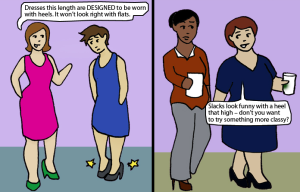
Credit: Quick Meme
A Rocky Beginning
Angela has been in and out of therapy since she was 13 due to depression. Her relationship with counseling started out as a rocky one.
Partly that’s because Angela’s family was divided between those without depression and those with it.
Those who weren’t suffering from depression didn’t believe that it was a real thing. Those who did have depression either didn’t talk about it or said that they could be magically “better” after a certain point.
Both judged her for going to therapy regularly and didn’t want to acknowledge her depression existed. This made Angela angry and sad.
Coming to Terms with Therapy as Necessary and Useful
Because Angela didn’t have the support she needed at home, it really wasn’t easy to be okay with going to therapy at first.
This was feeling was intensified because Angela didn’t have a choice in the beginning. It was mandated by her parents and the police.
Plus, the first couple counselors she did see just didn’t seem to get her. In the end, she was kicked out of 4 different therapists offices until she finally found a therapist who understood her.
With this therapist, she was finally able to come to terms with counseling and depression as a part of her life. She needed the safe environment of her therapist’s office to be able to talk about her depression in a way she couldn’t at home.
Finding that safe environment was important because then she could be sure that her therapist wouldn’t just give up on her or make her feel like her 13-year-old problems weren’t a big deal. She wanted her therapist to know that even though she was 13, her problems were no less important and significant than someone who was twice her age.
With a therapist she could connect and feel listened by, she was able to being the process of healing.
Why Was Going to Therapy so Difficult for Angela?
The fact that she felt like she couldn’t talk about being depressed in anywhere besides her therapist’s office made Angela feel awkward and different.
She felt alienated from family and friends throughout high school because she didn’t talk about it. Even in college, though it got better, it still wasn’t great.
Now that Angela is able to look back on her 13 year old self, she understands why she never felt like she could be open with her middle school and high school friends about therapy.
She gets why she felt like she had something wrong with her when she had to go talk to a counselor and why her family doesn’t like to talk about it.
It’s because of the stigma that society attaches to going to therapy.
Is the Stigma Attached to Therapy a Big Deal for Angela?
Yes. It is.
It has prevented her from being herself and opening up to others if she thinks that she will be judged as weak or broken.
Plus, when people don’t believe that depression is real and that therapy can help, she feels like she’s fighting a losing battle to try and convince them.
Over time, Angela has concluded that a lot of people in her life didn’t believe in therapy or depression because you can’t see it.
For Angela, depression has been an invisible illness. It’s not like breaking your arm or your leg. There is nothing visible to show that something is broken.
And not being able to physically see the “break” has made her family and friends doubt its existence and criticize her for not being able to just BE HAPPY.
In spite of this, Angela continues to go to therapy and has found it to be a wonderful way to find balance in her life. She knows that therapy has become an indispensable part of helping her be who she really is.
Eventually, she hopes that others can also accept this part of her and realize that everyone can use a helping hand at some point in their life from someone else.
And that asking for that help shouldn’t be embarrassing.
Do you think there is a stigma attached to therapy and depression too?
Amy Shaw is a contributing writer for Everyday Feminism. She is a recent graduate from Washington College where she studied International Studies and History and is currently working in Missoula Montana. Amy loves spending time outside, listening to music, and trying new vegetarian recipes.
Search our 3000+ articles!
Read our articles about:
Our online racial justice training
Used by hundreds of universities, non-profits, and businesses.
Click to learn more




















